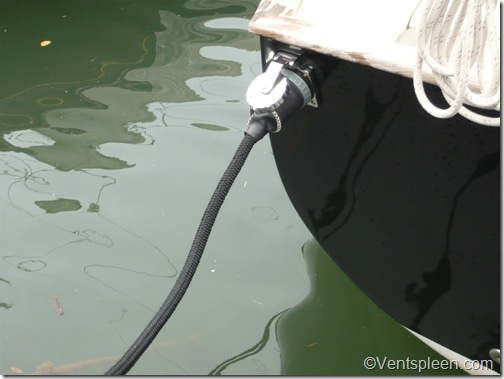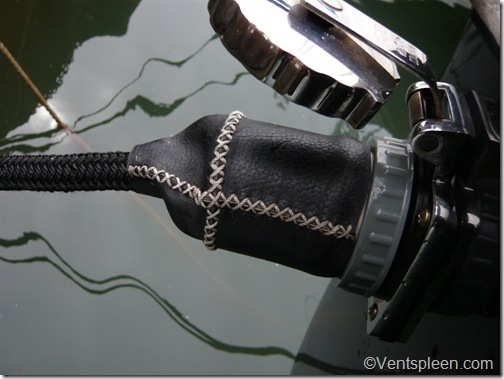It’s all very well having a brightly coloured plastic shore power lead for your boat but it doesn’t look very nice and the plastic gets dirty and marks the boat. So here’s a simple solution made using a piece of rope.
Many ropes today are braided. That means that they have an inner rope covered by an outer sheath of woven rope. This adds comfort and helps to protect the inner rope from chafe and UV damage.
To make a rope effect power cable, simply find a rope where the inner part is the same size as the cable you wish to cover. Using a hot knife cut around the rope cutting in only deep enough to cut off a few inches of the braided cover. Do not cut into the inner rope.
Now you can tape the electric cable to the inner rope and as you pull the inner rope out, the electric cable will feed into the cover in its place. You could feed the cable in afterwards by compressing the cover to make it larger as you go but you need a very clean taped end that can’t get snagged and plenty of patience!
Now connect up your plugs as usual. If you can fit the braid around the cable and clamp it with the plugs own cable clamps then do so but you might find that the bundle is too thick. In this case take it as close as you can and finished with a whipping sewn through the braiding so it can’t slip.
If you want to really make it look smart, consider making a leather boot to fit around the plug at the boat end. This keeps water out and sun off.
The rope covering doesn’t get dirty, or if it does you really can’t tell. It doesn’t mark the boat either. It protects the cable inside, looks very smart and costs very little to do. It’s certainly a vast improvement on the usual variety of ugly electric cables seen on any walk on any dockside!
Update: I offered an article about this covered electric cable to an American yachting magazine who shall remain nameless, but they rejected it even though they liked the idea.
Why did they reject it? Well I’ll tell you. They felt that it was far too dangerous to condone the action of actually taking a plug off and putting it back on again. Personally I felt rather sad that they think so little of their readers. I would have thought that changing a plug was within the capabilities of most sailors, after all, anyone who chooses to go off shore in a little boat must be fairly competent in the first place.
To make matters worse, the American marine plug is even more idiot proof that the European one, not only are the holes that take the wires colour coded, even the screws that tighten the wires are colour coded. Honestly I would expect any ten year old to be able to wire a plug.
What is really tragic is the fact that this kind of censorship is actually self defeating. If you do not allow people to try new things they will become even more dependent on others to be able to function in this complicated world. This magazine should encouraging self reliance and confidence, both necessary qualities for any sailor instead of being paranoid of the possible consequences.
I ask you, where does it end? Should they not run articles about making something because a power tool was used at some point? After all power tools are dangerous. Should they not run articles about painting? After all paint is dangerous. The fumes might make you dizzy and fall over.
So know this, changing a plug is very dangerous. You might electrocute yourself or others if you risk doing such a complicated job on your own without specialised and expert supervision on hand to assist if you get confused by the three coloured wires. You have been warned.

